#hazbin meta
Text
Alastor being aroace makes his dynamic with Vox like 100% funnier. It's a villain rivalry, you immediately know people will look at these two and think "they crave each other carnally", except only one of them has the capacity for it. Which is the perfect set up for a ridiculous one-sided obsession, but then Alastor is shown to be acting way more unbothered by Vox than he actually is. Dude is walking the streets of Hell menacingly staring into cameras and doesn't even have the excuse of homosexuality. Both of these fuckers are goofy as hell.
#hazbin hotel#alastor#vox#they have everything wrong with them#tv or radio#original post#hazbin meta#aroace alastor
18K notes
·
View notes
Text
a brief take on the whole "Alastor's smile is permanent" discussion
hello all!
I've seen a lot of people theorizing lately that Alastor actually smiles all the time because his smile is magically, physically fixed onto his face. All of this seems to come from the fact that he's practically grimacing rather than smiling during the scene where he breaks down in ep8:
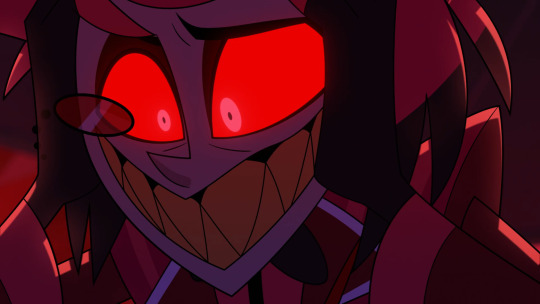
As well as this frame of his deal with Charlie: (lower res sorry)

I will say, I do like some of the implications of this theory. The sheer spite of his creditor forcing him to smile as an addition to their deal, almost like a sort of forced silence, is a neat concept. It's fun and dramatic. Plus, of all things, of course Alastor would claim the "smile at all times" policy and make it his own to pretend that it was his decision all along lol.
To be fair, though, I don't think we even need any magical compulsion to explain why he's smiling while he's having a mental breakdown. Actually, if we assume magical compulsion, I think we lose a bit of dimension from Alastor's character. (No judgement to anyone's take though, of course -- I just think this works in the direction of his established characterization, but obviously all personal takes <3)
Hear me out:
Alastor's persona is not just for others to see.
"A smile is a valuable tool, my dear. It inspires your friends; keeps your enemies guessing; and ensures that whatever comes your way, you're the one in control."
That makes sense given what we know about him. If he's always smiling, he seems like he has it together. You can't read him very well, especially not when he's actively trying to keep up appearances.
Now consider that when you think about ep8's fight with Heaven, we see that he's already been through so much in this one day.
He fights an army of angels, presumably not even at his own whim (if we go by his blurb about freedom in the Finale song); he loses to Adam, who he considers sloppy and mediocre; his staff, which we can assume holds some part of his power, is snapped; he comes close to being Angelic-power-killed; and to top it all off, he knows that others watched him get injured and then apparently die or flee, all of which would ruin the public image that he's trying to maintain. It wouldn't even be unreasonable for us to assume that he knows Vox was watching, given that Vox kind of has eyes everywhere.
In a moment like this, in the finale, you could say that Alastor has lost (at least on some level) everything that we know matters to him. He doesn't have access to all of his magic, and it's limiting him. He's reminded that he doesn't have freedom or control over his own destiny. He certainly has taken massive hits to his powerful, composed persona. But he's desperate, and furious, and terrified, and clinging on.
That's why he's smiling.
It's not that he can't stop because he physically can't. It's that he can't stop because to him, the smile is the last thing that is still within his power. When there are so many moving parts that he can't predict what happens to him next, he can control how he responds to it. In these last fragments of autonomy, there is solace.
He needs to keep telling himself that he has it together and that he'll eventually scheme his way free, that there's a solution, that he won't be in chains forever; because letting his pretense slip would be admitting that it's all starting to actually get to him. That maybe this time, he doesn't have an escape plan.
In addition, if you read his interactions throughout the series, we also see something else: Alastor's reputation is of paramount importance to him. At multiple points throughout the series, when others disrespect him by discounting his power or presence, he gets visibly annoyed. And in the battle, we see a glimpse of the part of his personality he seems to be trying to leave behind - a normal Alastor, who's just some guy from Louisiana. No transatlantic accent; no unflappable malice; no sharp wit waiting at the ready. Maybe even unremarkable.
Dropping his smile - arguably the most prominent part of his brand - would be admitting that in reality, he's not the Radio Demon of legend that he aspires to project. And if he doesn't have that... where would he be?
#alastor meta#alastor analysis#hazbin hotel#hazbin alastor#alastor#alastor hazbin hotel#hazbin hotel alastor#hazbin alastor meta#hazbin meta#hazbin alastor analysis#bro I love this guy so much
866 notes
·
View notes
Text
i think it’s really funny how many people say that alastor is ace, not aroace, just because viv has only called him ace.
love you guys but you are GRAPHICALLY overestimating people’s knowledge on aromanticism and asexuality and how they are different. they have been confused with each other since their existence, and just because someone is queer doesn’t mean they’re incapable of confusing the terms or using them interchangeably. alastor is clearly shown to not have romantic feelings, just take a look at some of the official jokes.

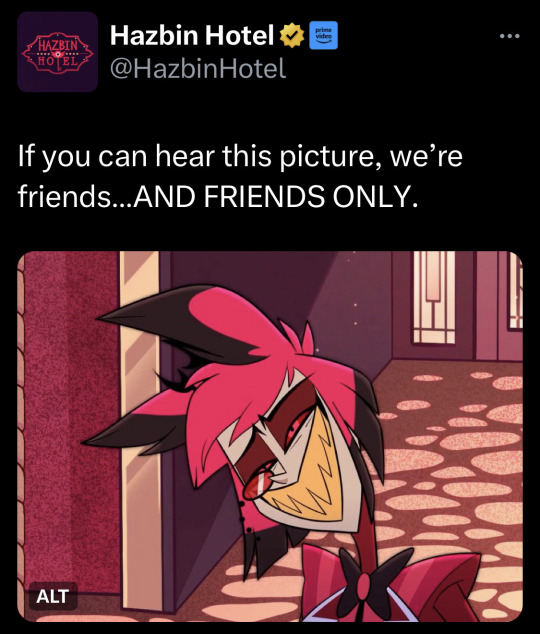
both of these are explicitly non-romantic. not just non-sexual, they are both jokes and comments about being aromantic, not asexual.
yes, rosie only mentions him being asexual in episode seven, but again, this is a joke made about the idea of him being in a ROMANTIC relationship. unless rosie was implying that she knows alastor and charlie wouldn’t fuck? which 😭😭 i don’t think she would do that??? it was definitely a joke about him not wanting romance because of his romantic and sexual orientation. and yes, i understand how annoying it is that asexuality and aromanticism are being used interchangeable in this instance, and this is an issue ace/aro people have been facing for years, but this is clearly a joke about him being aroace, not just ace.
again, you guys are giving alloromantic/allosexual people WAY too much credit on how much they know about ace/aro people, when most of their knowledge (if any) is “asexual people dont want sex, aromantic people don’t want romance” and that’s it. vivziepop, despite being queer herself, is still allo as far as im aware. allo people BARELY know anything about asexuality or aromanticism or care to learn the difference, and it’s clear that aro/aceness is being used interchangeably here. alastor is portrayed as aroace, and is clearly meant to be seen as aroace, even though he’s only ever been explicitly called ace by viv.
#this isnt even mentioning that his va called him aroace and viv never corrected him lol#(in front of her i might add)#hazbin hotel#hazbin hotel alastor#hazbin alastor#alastor the radio demon#asexual#aromantic#aroace#aroace alastor#aromantic alastor#asexual alastor#hazbin hotel meta#hazbin meta
565 notes
·
View notes
Text
Paradise Lost: How John Milton's 1667 work influenced "Hazbin Hotel"
I've been thinking about why the "fruit of knowledge" in Hazbin Hotel is depicted as an apple, as opposed to another fruit that would've been more accurate to the Middle East during the Fall of Man, as well as how Paradise Lost by John Milton (1667) influenced the show.
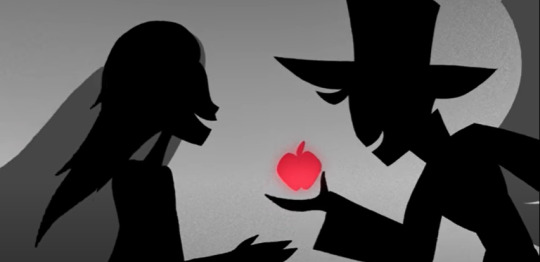
Per one source:
"Because the Hebrew Bible describes the forbidden fruit only as 'peri', the term for general fruit, no one knows [what exactly type of fruit it was]. It could be a fruit that doesn't exist anymore. Historians have speculated it may have been any one of these fruits: pomegranate, mango, fig, grapes, etrog or citron, carob, pear, quince, or mushroom."
Per Wikipedia:
"The pseudepigraphic Book of Enoch describes the tree of knowledge: 'It was like a species of the Tamarind tree, bearing fruit which resembled grapes extremely fine; and its fragrance extended to a considerable distance. I exclaimed, How beautiful is this tree, and how delightful is its appearance!' (1 Enoch 31:4)."
In Jewish and Islamic traditions, the "fruit of knowledge" is commonly identified with grapes. The Zohar explains that Noah attempted (but failed) to rectify the sin of Adam by using grape wine for holy purposes. Today, the "Noah grape" is still used to make white wine.

Furthermore:
"The association of the pomegranate with knowledge of the underworld as provided in the Ancient Greek legend of Hades and Persephone may also have given rise to an association with knowledge of the 'otherworld', tying-in with knowledge that is forbidden to mortals. It is also believed Hades offered Persephone a pomegranate to force her to stay with him in the underworld for 6 months of the year. Hades is the Greek god of the underworld, and the Bible states that whoever eats the forbidden fruit shall die."
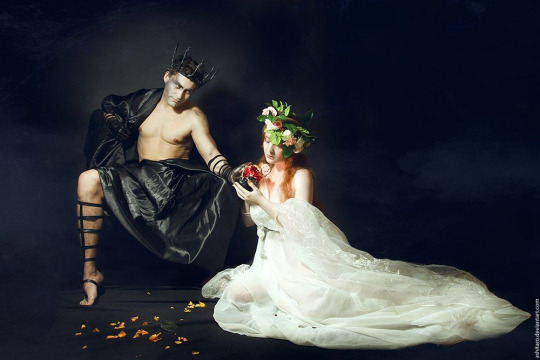
So, how then did the apple become the foremost symbol of the "fruit of knowledge"? You can partly thank Paradise Lost by English poet John Milton, a work which the lore of Hazbin Hotel is based off of.
Milton published the book in 1667, a time when the hedonistic Restoration era was in full swing. The exiled King Charles II was restored to the throne as King of England in 1660, and was a party animal, with dozens of mistresses, and nicknamed both the "playboy prince" and "Old Rowley", the latter after his favorite lustful stallion.
However, the association of the "fruit of knowledge" began with a Latin pun long before Milton immortalized the association in Paradise Lost. Per the linked article above by Nina Martyris for NPR:
"In order to explain, we have to go all the way back to the fourth century A.D., when Pope Damasus ordered his leading scholar of scripture, Jerome, to translate the Hebrew Bible into Latin. Jerome's path-breaking, 15-year project, which resulted in the canonical 'Vulgate', used the Latin spoken by the common man. As it turned out, the Latin words for evil and apple are the same: 'malus'.
[...] When Jerome was translating the 'Tree of the Knowledge of Good and Evil', the word 'malus' snaked in. A brilliant but controversial theologian, Jerome was known for his hot temper, but he obviously also had a rather cool sense of humor.
'Jerome had several options,' says Robert Appelbaum, a professor of English literature at Sweden's Uppsala University. 'But he hit upon the idea of translating 'peri' as 'malus', which in Latin has two very different meanings. As an adjective, 'malus' means 'bad' or 'evil'. As a noun it seems to mean an apple, in our own sense of the word, coming from the very common tree now known officially as the 'Malus pumila'. So Jerome came up with a very good pun.'
The story doesn't end there. 'To complicate things even more,' says Appelbaum, 'the word 'malus' in Jerome's time, and for a long time after, could refer to any fleshy seed-bearing fruit. A pear was a kind of 'malus'. So was the fig, the peach, and so forth.'
Which explains why Michelangelo's Sistine Chapel fresco features a serpent coiled around a fig tree. But the apple began to dominate Fall artworks in Europe after the German artist Albrecht Dürer's famous 1504 engraving depicted the First Couple counterpoised beside an apple tree. It became a template for future artists such as Lucas Cranach the Elder, whose luminous Adam and Eve painting is hung with apples that glow like rubies.
Milton, then, was only following cultural tradition. But he was a renowned Cambridge intellectual fluent in Latin, Greek and Hebrew, who served as secretary for foreign tongues to Oliver Cromwell during the Commonwealth. If anyone was aware of the 'malus' pun, it would be him, and yet he chose to run it with it. Why?
Appelbaum says that Milton's use of the term 'apple' was ambiguous. 'Even in Milton's time the word had two meanings: either what was our common apple, or, again, any fleshy seed-bearing fruit. Milton probably had in mind an ambiguously named object with a variety of connotations as well as denotations, most but not all of them associating the idea of the apple with a kind of innocence, though also with a kind of intoxication, since hard apple cider was a common English drink.'
It was only later readers of Milton, says Appelbaum, who thought of 'apple' as 'apple', and not any seed-bearing fruit. For them, the forbidden fruit became synonymous with the 'malus pumila'. As a widely read canonical work, 'Paradise Lost' was influential in cementing the role of apple in the Fall of Man story."
To tie this back into John Milton's relationship with King Charles II of England, as mentioned, Milton originally served Oliver Cromwell, Lord Protector of England, and the English Commonwealth, which was formed with the overthrow and execution of King Charles I on 30 January 1649, following the bloody English Civil War (1642 – 1651).
The King's two sons - the newly-christened King Charles II, the elder, and James, Duke of York (King James II), the younger - fled into exile on the European continent. However, with the death of Oliver Cromwell on 3 September 1658 came the 2-year-long dissolution of the English Commonwealth, and the restoration of the monarchy.
As for Milton himself, we can look to an article by Bill Potter.
Milton, born on 9 December 1608, was around 51-52 years old when King Charles II was restored to the throne. He attended Christ's Church, Cambridge in his youth, and mastered at least six languages, as well as history and philosophy; making him, perhaps, the most knowledgeable poet in history. He spent more than a year travelling across Europe, conversing with and learning from intellectuals, linguists, poets, and artists, including the famous Galileo Galilei.
However, Milton was a controversial figure of his time, being unafraid to criticize institutions of authority; arguing that "divorce was Biblical", for which he was routinely condemned; joining the Puritans; penning the Areopagitica, a treatise on liberty in favor of Parliament and the Roundhead rebels, during the reign of King Charles I, arguing that the King must be held accountable by the people; and agreed with and justified the murder of King Charles I, for which Parliament hired him in 1649 as a propagandist and correspondence secretary to foreign powers, on account of his fiery manifestos against "the man".
The collapse of the Commonwealth with the death of Oliver Cromwell in 1658 did not deter Milton from continued political writing against the monarchy and the new public sentiment that brought about its Restoration under King Charles II in 1660. On the contrary, Milton - now totally blind, having lost his eyesight by the age of 44 in 1652, a decade earlier - began writing Paradise Lost in 1661, and spent the next six years dictating the work to transcribers.
A supporter of regicide, Milton was also forced into exile himself, and faked his own death, as Charles refused to pardon - and sought to execute - any of those directly involved with his father's murder. Milton's friends held a mock funeral for Milton on 27 August 1660, just months after the coronation of King Charles II on 23 April 1660.
King Charles II commented that he "applauded his [Milton's] policy in escaping the punishment of death [execution for treason] by a reasonable show of dying", but insisted on a public spectacle nonetheless by having Milton's writings burned by the public hangman.
After eventually obtaining a general pardon from King Charles II, Milton was imprisoned, and released, likely due to political friends in high places. He died, aged 64, in 1674. His theological views were sometimes considered heterodox by the best Puritans, and his political views came close to getting him executed on several occasions. His poetry, however, has endured as some of the greatest works in the English language, especially Paradise Lost; much of his greatest work was written during his 22 years of complete blindness.
One of the main factors in King Charles II deciding to grant a pardon to Milton was, ironically, Paradise Lost. While originally written by Milton as a scathing criticism of King Charles II and the monarchy - depicting Lucifer Morningstar as a sympathetic rebel against God, with King Charles II claiming that is right to rule came from "divine ordainment" - Charles II enjoyed the work, and authorized its publication on 20 August 1667. We know this because a 1668 copy of Paradise Lost in royal bindings by Samuel Mearne, bound lovingly in a fine red leather made of goat skins tanned with sumac, and stamped in gold with the royal cypher of King Charles II, was found. The endpapers bore a watermark with the royal arms of Charles II.
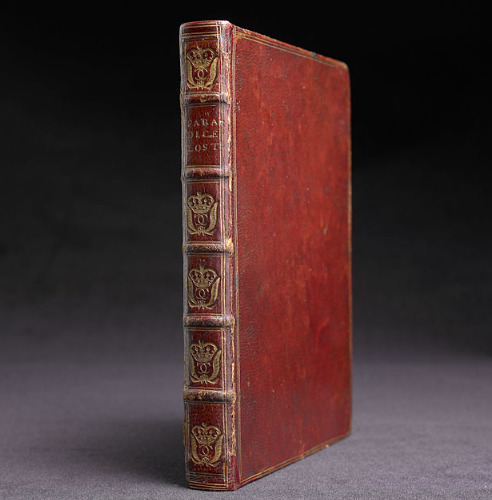
Per one Miltonian scholar: "The most single important event in Milton's life was the event against which he struggled most: the Restoration of Charles II, [and his relationship with the King]. Had it not come, we might have never had Paradise Lost...certainly, we should never have had [it] in [its] present power and significance."
Milton followed up Paradise Lost with Paradise Regained in 1671, three years before his death, with advice for King Charles II, urging the hedonistic Charles to "reign over himself and his passions":
"For therein stands the office of a King, His Honour, Vertue, Merit and chief Praise, That for the Publick all this weight he bears. Yet he who reigns within himself, and rules Passions, Desires, and Fears, is more a King; Which every wise and vertuous man attains: And who attains not, ill aspires to rule Cities of men, or head-strong Multitudes, Subject himself to Anarchy within, Or lawless passions in him which he serves." - John Milton, Paradise Regained, Book II, lines 463-472
To summarize: "If we must have a King back again, my Lord, please try to be a good man, unlike your father, who fell to his pride, [which was also the downfall of Lucifer]."
To quote another source: "Though the passage begins by noting that the office of a King is to bear the weight of public concerns, it is the control of one's private concerns that truly set a King apart as a virtuous character. Indeed, so important is self-command that any wise or virtuous man who attains it is like a king; any king who does not practice [self-command] is nothing more than a mere subject, ruled by anarchy and lawlessness."
Milton's words, too, echo a work written by Charles' grandfather, King James VI/I of Scotland and England: Basilikon Doron ("Royal Gift").
Per Wikipedia:
"'Basilikon Doron' (Βασιλικὸν Δῶρον) means 'royal gift' in Ancient Greek, and was written in the form of a private letter to James' eldest son, Henry, Duke of Rothesay (1594–1612). After Henry's death, James gave it to his second son, Charles, born 1600, later King Charles I. Seven copies were printed in Edinburgh in 1599, and it was republished in London in 1603, when it sold in the thousands.
This document is separated into three books, serving as general guidelines to follow to be an efficient monarch. The first describes a king's duty towards God as a Christian. The second focuses on the roles and responsibilities in office. The third concerns proper behaviour in daily life.
As the first part is concerned with being a good Christian, James instructed his son to love and respect God as well as to fear Him. Furthermore, it is essential to carefully study the Scripture (the Bible) and especially specific books in both the Old and New Testaments. Lastly, he must pray often and always be thankful for what God has given him.
In the second book, James encouraged his son to be a good king, as opposed to a tyrant, by establishing and executing laws as well as governing with justice and equality, such as by boosting the economy. The final portion of the Basilikon Doron focuses on the daily life of a monarch.
All of these guidelines composed an underlying code of conduct to be followed by all monarchs and heads of state to rule and govern efficiently. James assembled these directions as a result of his own experience and upbringing. He, therefore, offered the 'Basilikon Doron' ('Royal Gift') to his son, with the hope of rendering him a capable ruler, and perhaps to pass it down to future generations.
Overall, it repeats the argument for the divine right of kings, as set out in 'The True Law of Free Monarchies', which was also written by James. It warns against 'Papists' (Roman Catholics) and derides Puritans, in keeping with his philosophy of following a 'middle path', which is also reflected in the preface to the 1611 King James Bible. It also advocates removing the Apocrypha from the Bible."
King James VI/I further instructed his son and grandson:
"A good monarch must be well acquainted with his subjects, and so it would be wise to visit each of the kingdoms every three years."
"During war or armed conflict, he should choose old-but-good captains to lead an army of young and agile soldiers."
"In the court and the household, [a royal] should carefully select loyal gentlemen and servants to surround him. When the time came to choose a wife, it would be best if she were of the same religion and had a generous estate. However, she must not meddle with governmental politics, but perform her domestic duties."
"As for inheritance, to ensure stability, the kingdom should be left to the eldest son, not divided among all children."
"Lastly, it is most important...that [a royal] would know well his own craft...to properly govern over his subjects. To do so, [one] must study the laws of the kingdom, and actively participate in the council. Furthermore, [one] must be acquainted with mathematics for military purposes, and world history for foreign policy."
"[A royal] must also not drink and sleep excessively. His wardrobe should always be clean and proper, and he must never let his hair and nails grow long. In his writing and speech, he should use honest and plain language."
King James VI/I further supplemented Basilikon Doron with a written treatise titled The True Law of Free Monarchies: Or, The Reciprocal and Mutual Duty Between a Free King and His Natural Subjects.
"It is believed King James VI/I wrote the tract to set forth his idea of absolutist monarchism in clear contrast to the contractarian views espoused by, among others, James' tutor George Buchanan (in 'De Jure Regni apud Scotos'), [which] held the idea that monarchs rule in accordance of some sort of social contract with their people. James saw the divine right of kings as an extension of the apostolic succession, as both not being subjected by humanly laws."
Milton's own Areopagitica was a follow-up on De Jure Regni apid Scotos by George Buchanan, and also to The True Law of Free Monarchies, as well as the idea of the "divine right of kings". It takes its title in part from Areopagitikos (Greek: Ἀρεοπαγιτικός), a speech written by Athenian orator Isocrates in the 4th century BC.
Most importantly, Milton also wrote on the concept of free will: "Milton's ideas were ahead of his time in the sense that he anticipated the arguments of later advocates of freedom of the press by relating the concept of free will, and choice to individual expression and right."
The concept of free will, too, was a major topic explored in Paradise Lost. Per one source: "In 'Paradise Lost', Milton argues that though God foresaw the Fall of Man, he still didn't influence Adam and Eve's free will. [...] God specifically says that he gives his creatures the option to serve or disobey, as he wants obedience that is freely given [or chosen], not forced. Some critics have claimed that the God of the poem undercuts his own arguments; however, Milton did not believe in the Calvinistic idea of 'predestination' (that God has already decided who is going to Hell and who to Heaven), but he often comes close to describing a Calvinistic God. God purposefully lets Lucifer (Satan) escape Hell, and sneak past Uriel into the Garden of Eden, and basically orchestrates the whole situation so that humanity can be easily ruined by a single disobedient act. In describing the Fall of Man before it happens, God already predicts how he will remedy it, and give greater glory to himself by sending his Son [Jesus Christ] to die, and restore the order of Heaven."
In Hazbin Hotel, Adam also describes the Calvinistic idea of 'predestination', and that "the rules are black and white":

However, "This possible predestination leads to the theory of the 'fortunate fall', which is based on Adam's delight at learning of the eventual coming of the Messiah [from his bloodline]. This idea says that God allowed the Fall of Man, so that he could bring good out of it, possibly more good than would have occurred without the Fall, and be able to show his love and power through the incarnation of his Son. In this way, the free will of Adam and Eve (and Lucifer/Satan) remains basically free, but still fits into God's overarching plan."
However, there is one major flaw with this, and that is that we don't know if Jesus Christ exists within the Hazbin Hotel universe or not. Yet Charlie Morningstar, the daughter of Lucifer Morningstar and Lilith, and the "Princess of Hell", is depicted as a savior-esque figure within the show who, like God in Paradise Lost, encourages lowly sinners to choose obedience to God out of their own free will. More interestingly, Charlie does not come from Adam's bloodline; yet, while Lucifer decries 'free will', Charlie supports 'free will' instead.
Perhaps is is merely because Charlie, being the daughter of Lucifer and Lilith, claims to want to fulfill Lilith's "dream" of humanity being empowered in Hell ("The mind is its own place, it can make Heaven out of Hell, or Hell out of Heaven" - Lucifer, Paradise Lost); however, I think it also stems from Charlie having a genuine belief that 'free will', and people choosing to do good instead of evil, is "good" and "Godly".
True to Paradise Lost, this is also in fulfillment of God's plan; and, according to one fanfiction, why God allowed Charlie to be born to Lucifer and Lilith, so that sinners may be redeemed through Charlie.
For more on differing interpretations of 'free will', I suggest reading: "Free Will and the Diminishing Importance of God's Will: A Study of Paradise Lost and Supernatural" by Kimberly Batchelor (2016)
Excerpt: "'Paradise Lost' –and Milton’s purpose for writing the poem— is rooted deeply in postreformation Arminianism and this is apparent in its employment of free will. Chapter 1 argues that Milton turns to free will as a tool to justify the actions of God. Freedom of choice is God-given, and sets up a morality in which right and wrong are dictated by God. Chapter 2 shows that in 'Supernatural', free will is not given by a higher power; and, in fact, free choice functions as an act of defiance against God's will."
This raises the question: Is 'free will' given by God, using Lucifer as his vessel, in Hazbin Hotel, as in Paradise Lost? Or is 'free will' not given by a higher power; and, in fact, an act of defiance against God?
This brings us back around to our first question: Why is an apple, or 'malus', used to depict the "fruit of knowledge", especially if 'malus' means 'bad or evil', whereas Milton depicts 'free will' as God-given?
Well, for one, Lucifer still chooses to associate himself with apple symbolism and imagery, despite being skeptical of free will:
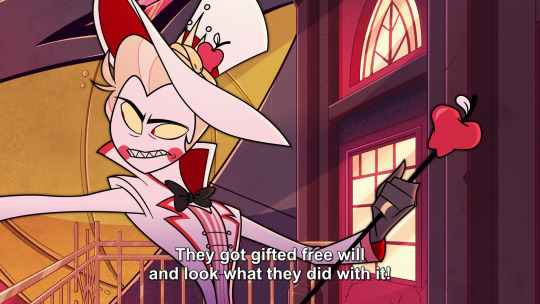
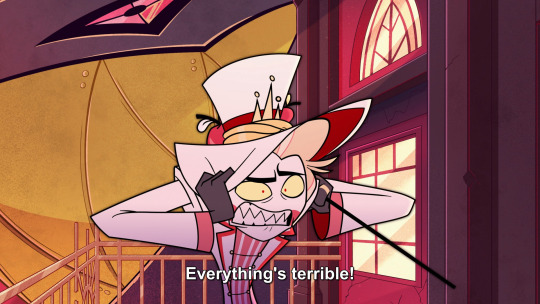
Based on the introduction to Episode 1, Charlie also views 'free will' as a gift (Miltonian), whereas Lucifer appears to view it as a curse.
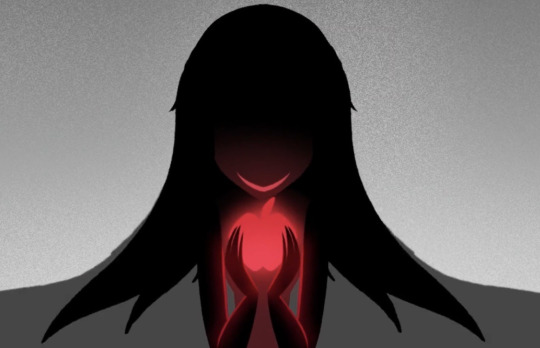
However, Charlie also notes that it was through the 'gift' of free will that the "root of all evil" entered the world, for if mankind could choose to be good, then they could also choose to be evil ('malus').
John Milton states in Paradise Lost: "Of Man's First Disobedience, and the Fruit Of that Forbidden Tree [malus], whose mortal taste Brought Death (evil, malus) into the World, and all our woe."
Thus, the use of an apple specifically is likely a tie-in to what others have been speculating about a character that series creator Vivienne Medrano (Vivziepop) alluded to a while back: "The Root of All Evil".
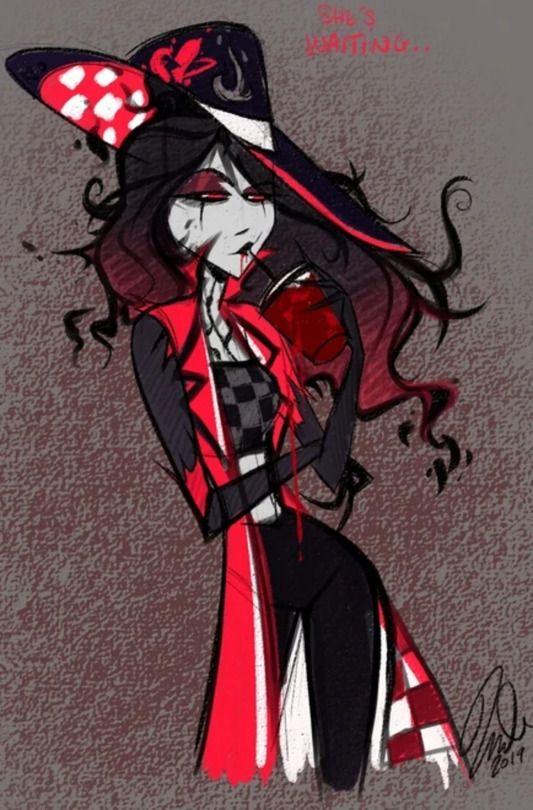
However, "Roo" itself is depicted as possessing the body of a human woman, presumably Eve, the first one to eat the "fruit of knowledge":
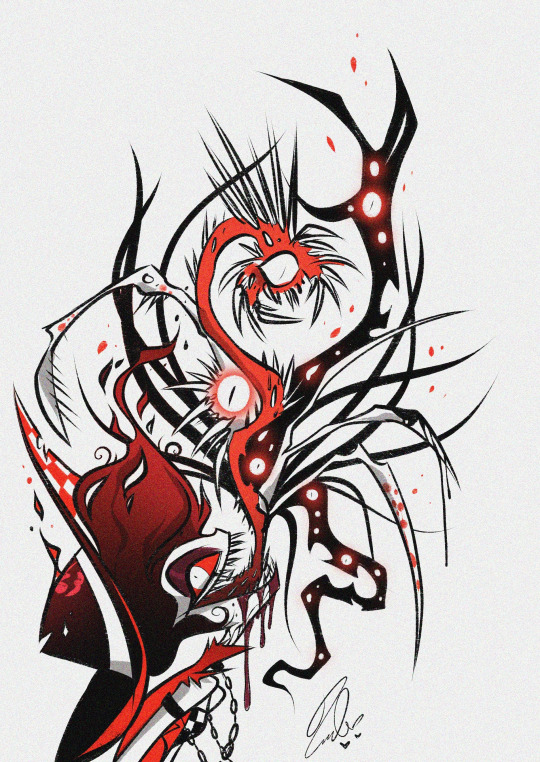
Thus, we can discern that "Malus" likely refers to this character. (Also see: "Maleficent", a name that also uses the root word "mal", "evil".) As for Roo's intentions, if Charlie is "good" - and, if, in fact, Alastor was sent by "Roo" (Eve) - then they may want for Alastor to work on their behalf to "corrupt" Charlie, or make sure the hotel never succeeds.
This is because demonic power is tied to human souls, and there are "millions of souls" in Hell, which likely fuels the great power of "Roo". The more souls there are in Hell, the more powerful "Roo" becomes. The Overlords also get their demonic power from "millions of souls".
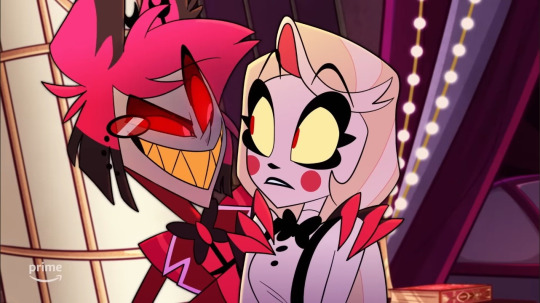
The deal between Eve and "Roo" might even be the first contract, or deal, between a human soul and a demonic entity; in exchange for 'free will', and the knowledge of good and evil, Eve allowed the "Root of All Evil" to inhabit her body, and to escape the void or prison it was confined to by Heaven (Hell?). (For one cannot be 'all-good' unless you attempt to 'eliminate' or 'ablate' evil; and, in Greek mythology, Zeus imprisoned the Titans in Tartarus for all of their evil deeds.)
Another possibility, brought up in an article by Gillian Osborne, is that Lucifer sees the "fruit of knowledge" as an apple, but it may appear as different fruits to different people, depending on how they view it. This also fits with Lucifer and angels being able to easily shapeshift.
In Paradise Lost, only Lucifer describes the fruit as an "apple" (malus), as he associates malus with "bad, evil", while the narrator also describes the fruit as "a mix of different colors" and peach-like. This then begs the question: "Did the fruit of knowledge of good and evil become 'evil' because Eve harbored resentment towards Adam?"
Quote: "Lucifer (Satan) gives Eve yet another hint that this tree may be more complicated than he wishes her to believe: although elsewhere in Milton's poem Eden is heady with its own newness, sprouting spring flowers left and right, the tree of knowledge is already old: its trunk is 'mossie'. Nevertheless, Lucifer claims to wind himself around the tree 'soon'; the quickness of his reported arrival stands in contrast to the timescales required to cover a fruit tree with moss (PL 9.589). Placing Lucifer's winding body between these two timescales—an easeful present and the inhuman scale of natural history—Milton suggests that there is something dangerous in entangling the past with the present. Yet, 'Paradise Lost' also makes deep biblical history feel like present politics for its readers. When Adam and Eve wander out of Eden at the end of the poem, they famously make their way not only into an earthly paradise, but also into the present. Eden's mossy apple tree therefore represents the pitfalls of conflating nature and history, of seeing any action in human history—even Eve's eating of an apple—as natural, if by nature, we mean inevitability. For Milton, history, unlike nature, is directed by humans, progressive, and, like the reading of 'Paradise Lost', hard work. While trees may inevitably collect moss the longer they live, Adam and Eve's labors in the garden, and our labors of reading, require agency and effort. Milton's poem refuses mourning the loss of Eden, [and the perfection of Heaven], in favor of a perpetual, melancholic, recreation of paradise: a present perfecting."
To quote Twisted: The Untold Story of a Royal Vizier, which also draws inspiration from John Milton's Paradise Lost: "It's an unfortunate situation...but you do have a choice [i.e. free will]."
#hazbin hotel#hazbin hotel analysis#hazbin#hazbin analysis#hazbin hotel meta#hazbin meta#hazbin hotel theory#hazbin theory#deep thoughts#john milton#paradise lost#eve hazbin hotel#lucifer hazbin hotel#lucifer morningstar#adam hazbin hotel#lilith hazbin hotel#lilith morningstar#roo hazbin hotel#root of all evil
205 notes
·
View notes
Text
Episode 4 of Hazbin is quite literally the best episode so far. It doesn't suffer from the vivzieisms that the first three episodes did and fundamentally told a better story about an SA and abuse survivor than I've seen in a long time, speaking from being an SA survivor. Angel being an unperfect and sometimes downright awful person with how he acts around people is really important to portray. When people always see perfect victims, they then like to dismiss victims who are assholes. NEWSFLASH!!! Many victims suffer negatively to their social skills when they are being abused!
Especially with Angel's hypersexual demeanor to everyone, I find it so refreshing how he even sees the need to be desired by everyone as crucial while also hoping that they reject him the same time. He feels the need to be the person that he pretends to be in all his videos because then he is desired by people; wanted. But he hates being Valentino's favorite toy. He needs to be wanted, but hates hates the biggest source of it, since it is the source of his abuse.
#hazbin#hazbin hotel#angel dust#helluva boss#hazbin meta#hazbin hotel angel dust#hazbin hotel meta#hazbin analysis#hazbin hotel analysis#character analysis#angel dust analysis#vivziepop#vivzieverse
178 notes
·
View notes
Text
Adam's return
I would absolutely love if Adam came back as a demon and became a permanent resident of the hotel, one because it would be hilarious to see his dynamic with the main cast, specifically Alastor, Lucifer and Nifty. But also because I believe it would be incredibly thematically appropriate considering the theme of the show is redemption, and sadly because the show was given so few episodes I don't believe it had enough time to dig into the rehabilitation of the residents whilst also trying to establish the world and get us invested.
Which is why I hope with the next season with all the establishing out of the way we can truly focus more on the main premise of the show. Which leads into why I think it would be great if Adam became a resident because it would really challenge Charlie on what redemption means and if anyone can really change, even someone as vile as Adam. It would also be fascinating to see Adam come to grips with the fact that he was cast out of heaven and the only one he can blame is himself, and whilst I fully believe he would be in denial of his faults at the beginning it would be fun to see him be brought back down to reality and face the truth of who he has really become.
However, just because I want to explore what it would be like for Adam to go on the path to redemption that doesn't mean I actually want to see him reach heaven. Instead I would like it if they use his character to explore the concept of only doing good thing's for a perceived reword at the end and how you can instead find comfort of becoming a better person even if you are never fully forgiven by the people you hurt. Perhaps, by the end of the show Adam has stopped being a resident of the hotel and instead one of the employees working to make hell a better place to live in for all, I think that would be a nice end to his character.
Plus there's also his relationship with Lute which would be completely upheaved if the creators went with this route, since Lute has made it very clear that she believes sinners and by extension redemption to be an abomination, so it's would be fascinating to see her react to her boss and someone she was clearly devoted to become one of these demons and not only that but he has taken haven in the very place they both tried to destroy. Now that! is interesting and I would love to see how that would play out, even more if Adam gets to experience first hand what it's like to be hunted by an exorcist.
However, that being said I am also perfectly fine with him staying dead as Hazbin already has a ton of characters and since we don't know if the next season will get more episodes it would probably be for the best to focus on developing the main characters an not focus on any unnecessary material.
But hey that's just my thoughts.

#hazbin hotel#hazbin spoilers#hazbin adam#hazbin hotel adam#hazbin theory#hazbin hotel theory#hazbin alastor#hazbin hotel alastor#hazbin lucifer#character analysis#hazbin meta#meta analysis#hazbin hotel season 1
104 notes
·
View notes
Text
I’ve seen a lot of people talking about how the exorcists look like demons, and while I do understand where the complaint is coming from I also wanted to talk about how them looking like that kind of supports the narrative.
I’m going to start this off by staying this is from a perspective looking at the narrative presented to us in the Hellaverse, not any specific religion because 1) I am an atheist who doesn’t have the knowledge or background for making any calls on that and 2) the canon hasn’t confirmed this adheres to a specific belief system. There’s Adam and Eve and Hell and Heaven and yes, but this show arguably works as a parody of all of that.
Now that that’s established, I want to bring up one of the main points in the show: the idea that those in Heaven and Hell aren’t that different. In Helluva we’re shown the experiences of hell-born, and we even see cherubs later on who seem to fulfill the parallel role of them in Heaven (with the IMP vs CHERUB fight.) We also know that Lucifer was an angel in this canon. So some of the characters with the most authority in those domains are from the same stock.
The main difference seems to be punishment. Lucifer was punished for his actions and was given those who were deemed “Sinners.” The Hell born seem to be just natives living there and many seem to be products of their environment. So while Sinners may be “bad” and Winners “good”, all those born in Heaven or Hell have no reason for being there.
Whether exorcists are brought to heaven or made there, there is still that view of superiority. The way Lute talks makes it clear she’d be willing to kill the hellborn if she could, despite them not having done anything to be there like the Sinners. It’s similar to how some people born into high economic status view those born into lower. It’s just luck of the draw but now you have access to different opportunities and that influences the way you view others. Those born in Heaven probably look at those born in Hell and argue that if hellborn aren’t bad, then why does Hell suck? Ignoring the fact that Hell is established for the purpose of containing Sinners, who often end up being more powerful that the majority of hellborn.
Even some of the Sinners likely fall into that issue where people who gave to endure harsher environments may have to resort to more extreme measures to get by, and then punishment for it just causes them to need to do even more because their conditions worsened. As seen with the rate of people who keep returning to prison. With Hell some may have fallen down this path (think of Angel, who was born into a crime family, it’s likely a lot easier to fall into drug addiction then when you have access and more things you’d like to forget, but drug addiction can be a slippery slope and the other stuff he needed to do to survive basically condemned him.) Obviously not all Sinners fall into this category and are just monstrous pieces of shit, but they likely isn’t the case for everyone.
Then, once you get to Hell it’s essentially a larger prison, except you aren’t separated and are given powers, causing some of the more malicious individuals to rise up and acquire power, making it even more of a nightmare for everyone else. This continues that cycle of having to do certain things to survive. Similar to have in jail that fear of getting hurt by some violent people make you align yourself with slightly less violent people. Except now in Hell there’s that added issue: there’s no escape.
(Also, Hell is a prison but you STILL have to pay rent and work to survive, so you really get the added stress of both worlds.)
Anyway, this whole cycle causes a similar effect to the growing class disparity we see in many countries. Those on top (Heaven) continue to have power while those lower have to deal with most of the burden. Reinforcing that belief in exorcists that Heaven is “good” and Hell is “bad” because they are unable to see the full picture. They just see it as “they blew their shot” without thinking of why that may be or considering the people who didn’t even have a choice being there— like how some people blame others in poverty for being that way because “they are lazy.” That’s not even remotely the full picture. But because certain things come easy for you it’s hard to understand why it can’t come easy for others.
Exorcists are then given the excuse and opportunity to kill others, people who they believe are lesser than them. And some take genuine joy out of it, yet they continue to see themselves as the “good guys” because that’s what they are and the others “deserve it.” And this shows how when some people are given the opportunity and reason to be assholes they’ll take it- millionaires don’t HAVE to exploit their employees, but they view it as being to their benefit and helping the bottom line.
So now, both exorcists and those in hell have reason and excuse to be violent, albeit for very different reasons. Yet because of this exorcists are still “good” and those in hell are “bad.” And this is largely because of the lack of consequences for their actions. Heaven reinforces their behavior, before episode 8 there was no push back from Hell, so they could continue to use their reasoning as an excuse to kill others.
They’re blind and don’t see it though. They only see the world from one perspective, which is ironic given the exorcist mask is missing an eye. They can put masks on and hurt others and then take them off without dealing with the consequences. They “go down” to the level of the very people they despise and then write it all off, because they have the comfort of taking their masks off at the end. Of having a choice.
It’s also interesting how their masks don’t resemble sinners but Hellborn. Which almost reminds me of mocking another’s culture while actively hurting them. They may not be able to physically hurt hellborn, but they’re still viewed through the same lens as Sinners. They’re still “bad.” So exorcists can don caricatures of their appearances, go around “pretending” to be them by committing violent acts, and when they’re done they can take it off. As I’m writing this I’m now thinking about how in the past black-face has been used to reinforce racist stereotypes, making racist caricatures.
This also camouflage in a way, maybe they were previously asked to “fit in” before things got all crazy, and when told to look for “demon disguises” they all fall back onto the stereotype and dressed up like that.
The usage of exorcists wearing demon-looking masks could be them both “playing bad” while also clearly showing the fact that at the core people aren’t so different. For as much as they hate those in hell, they’re just as likely to fall into the same traps and patterns as them.
Having written this all now, I wanted to bring up Vaggie. Vaggie who took her exorcist mask off to show sympathy for someone only to be punished and marked with an “X” that mirrors her mask. Vaggie who previously was part of the “elite”, where she could forgo consequences until she couldn’t for not following them and was cast out, being permanently marked. Vaggie, who was previously allowed given the gift to “play bad” due to being in Heaven, but when she was cast out “playing bad” wasn’t an option anymore. Taking off her mask can’t get rid of mistakes anymore, and now she has to display them for the world to see.
I don’t know if the “X” was intentional on her part or irony, but if she did choose it it could also be her recognizing her role in the system. Her realizing she can’t go back and using the “X” to remind her of what she’s done. Because she doesn’t have the luxury of pretending she’s a good person anymore— she doesn’t want to forget.
#if anyone wants out more knowledge on social issues wants to add anything feel free#I’m just using what I know from sociology classes as well as other classes discussing social inequalities#long rant but I got thinking and then thinking and thinking#and I was taking a bath cause sick and this got longer and longer#hazbin hotel#hazbin hotel theory#hazbin hotel meta#class disparity#inequality#exorcists hazbin hotel#lute hazbin hotel#vaggie#vaggie hazbin hotel#racism#social inequality#sociology#hazbin analysis#hazbin hotel analysis#hazbin meta#hazbin theory
77 notes
·
View notes
Text
The thing with Alastor is that I think he genuinely does like people. I don't think he cares too much about many individual persons, but when it comes to people as a collective he likes and wants to be liked back.
You don't go into entertainment if you don't want some kind of validation from it, and Alastor got so into radio in life that his soul was moulded around it in death.
And that's fundamentally the source of a lot of the conflict in his character.
Alastor wants to be the feared and hated Radio Demon. But he also wants to be ‘Al, that charming guy from the radio!’
Alastor wants to be treated with respect and terror at all times. But he also wants to have fun and joke around with people.
Alastor wants to keep the reasons for his disappearance a deadly secret. But he also wants to go to the Overlord meeting and have everyone dying to know where he was and what he was doing.
(“And when Alastor's not in the scene, all the other characters should be standing around like ‘hey, where's Alastor?’!”)
This is why Husk, up until he touches that particular sore spot, gets away with so much more in his relationship with Alastor than, say, Angel gets with Valentino.
Val wants Angel to be a tool or a toy he can control. Alastor kind of wants the same from Husk, but he also wants to be able to play the role of the cheeky but charming boss who can talk Husk around with a wink and a bottle of cheap booze.
(A role that Husk, for his part, goes along with because it allows him to keep some of his dignity. He gets to snark at Alastor and act like he still has even the slightest control over his own destiny. Alastor gets to laugh it off and act like he's a good employer. They both know it's a lie, but Husk clings to it because the alternative is even more humiliation, and Alastor finds it too much fun to give up.)
This is also I think the real reason he and Rosie are such good friends. Because Rosie is also 100% playacting.
Cannibal Town is a fucking dangerous place. Given that Charlie considered the “sights to see en route to my hotel” a selling point for joining her army (a hotel in walking distance) I'm guessing there are some restrictions preventing the residents from leaving. People eat corpses in the streets.
Rosie is clearly a fearsome and vicious Overlord in her own right. Even Lucifer's daughter is twitchy around Cannibal Town.
But, at the same time, when the streets aren't covered in blood and viscera, they're gleaming. The people are all well dressed. There are quaint little shops. Everyone is smiling, all the time.
It's clearly a stage play, but it's one that Rosie and the residents seem to enjoy acting out, and one that they let Alastor have a role in when he visits. In Cannibal Town, Alastor gets to be the charming young man about town whose smile brightens up the place and who everybody (except, ugh, Susan) is pals with.
And I think it's this conflict of personas that is ultimately going to be the biggest factor in whether Alastor ends up being a hero or a villain on the show.
Cause like, Alastor the altruist is obviously an act. But, so is the Radio Demon.
Alastor isn't an all powerful killing machine. In most of the scenes he's in, he's not even the most powerful person in the room. (Albeit
primarily because he's usually accompanied by Charlie.) And he's not acting purely on his own whims, he's on someone else's leash.
I don't think Alastor is necessarily capable of feeling remorse for the stuff he's done in the past. Or caring about other people more than he does himself. It's just not his character.
But I think he is capable, given time to get attached and a lot of positive reinforcement, of deciding that playing 'steadfast hotelier' for Charlie and co is more fun than playing the evil Radio Demon for everyone else.
Picking other people over himself is probably not something that's going to happen for Alastor any time soon. But picking one persona over the other? That I could see.
#alastor#the radio demon#hazbin hotel#hazbin meta#hazbin headcanons#charlie morningstar#hazbin hotel rosie#hazbin hotel husk#alastor hazbin hotel
108 notes
·
View notes
Text
He looks so terrified and panicked here...
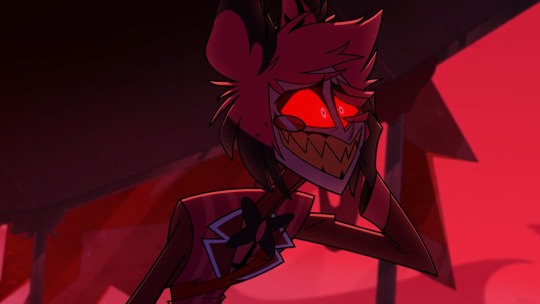

Can't help but feel for him. It seems like he is having an anxiety attack about two things at once: about how close he was to death (and probably at how weakened he is by that deal he made) and at the same time by the feelings he seems to have for the Hazbin residents.
I think that even thought the line he had about "altruist who almost died for his friends" was meant to be mocking and the narrative of how the others would see it if he died there, there was still some genuine fear from Alastor there about how close to the truth that sentence was.
Like I know this man is manipulating the shit out of everyone around him but i still believe that he somewhat cares for the Hazbin residents, even if it has a lot to do with him seeing them through the lens of how much he can gain from them and how he can use them.
Its like he doesn't want the fact that he cares about them to be something true, especially with the dialogue we got between him and Niffty at the beginning of episode 8 and how much fun he's been having.
In the end, I think he got comfortable and used to the Hazbin Hotel and his role in it all. And I think that scares the shit out of him.
#hazbin hotel#hazbin hotel spoilers#hazbin hotel season 1#hazbin alastor#hazbin meta#hazbin thoughts#gin posts hazbin hotel
57 notes
·
View notes
Text

And he thought that TWICE.
Poor man.
Set the cat in the hat free already, man.
(Maybe I'll draw it someday? It would be cool...)
#hazbin hotel spoilers#hazbin alastor#hazbin husk#hazbin hotel 2024#hazbin hotel#hazbin memes#hazbin meta#memes#humor
44 notes
·
View notes
Text
Favorite aspect of Alastor revealed in the show has gotta be that he loves being the center of attention. He's said to be an enigma, yet he thrives on people being curious about him. He wants to know what people think of his deal with Charlie. He wants people to wonder why he has been missing for seven years. And the majority of the few times we see his smile grow tense is when his mystery is disregarded.
Which explains why he enjoys his rivalry with Vox. Vox's obsession is a reliable source of attention for him. No matter what Alastor does, Vox will be there trying to undermine him. And watching him try is a dual source of enjoyment: it is fun to see his enemy stumble and glitch in frustration, but damn does Alastor also enjoy being in the spotlight, even if in the mind of just one person.
5K notes
·
View notes
Text
Why Alastor is good aroace rep after all, written by an aroace
Hello all! I just want to start off this post by saying that I'm one person who definitely doesn't speak for all aroaces, but I wanted to make a post on this anyway, and maybe some folk would be interested in hearing out another perspective?
I'm not really caught up on everything that's been said over the course of HH's creation - only more recent interviews, since I'm pretty new to the fandom. Apologies if I've missed anything, but also I do not have the time to keep up with all the out-of-canon-material backstory unfortunately. I'm working with what we've got here.
So here's the thing:
Alastor is cruel, he's narcissistic, he doesn't care about anyone except himself, he's a serial killer and a monster.
(That's the argument I've heard - please tell me if that's not really what people are going for lol, in which case I've totally misunderstood?)
The issue with aroace rep when it paints asexual people with those traits is that it aims to dehumanizes them. Sex and love are essential to the human experience, right? So why wouldn't someone be interested? Because they're self-absorbed, and cold, and detached. They don't have the capacity to love others enough to feel romance.
And sure, Alastor is a killer, and a schemer, and prideful, and a monster by hell's standards. But no matter how above it all and stylish and in control and provocative he wants to be, he's a very human character, and his aroace-ness never serves to add to his alienation. You could even say that it makes him seem even more personable.
That's what I think is the key difference.
why he's human
Alastor's whole persona is about control, and he basically straight-up says this. He's controlling what his enemies know, what his public image is like. His goal is to be the Radio Demon -- overlord of Hell, charismatic, Machiavellian, and undefeatable. He's not. Despite that smile plastered over his face (a powerful tool, huh) he's so expressive for someone who's constantly pretending.
You see his exasperation with the Egg Bois and with Charlie's ranting; his nervousness in front of Zestial; his frustration with Lucifer and the petty lengths he goes to to piss off the ruler of Hell.
You see his desperation, making that deal with Charlie. He's surprised by the idea of being vulnerable in front of an enemy like Adam, and so close to danger. He drops the radio filter and the affect out of fear, and runs on broadcast TV to let out panic and anger and bitterness in his hideout, where no one else can see him.
He has a smile that tells us he's genuinely happy to see someone; it's a little wider than his default. You see it with Mimzy's greeting, you see it with Rosie. Rosie, especially, serves to make Alastor more human to the audience. More on this later, but for now, I'm just saying that you can see that he at least seems to respect her greatly. Whatever bond they have, we know that he trusts her to touch him, to share history with him, and with support that he trusts no one else for.
He pretends, but he can't pretend it all away. Loads of these emotions aren't even advantageous for him to show. It isn't necessarily how the typical asexual psychopath acts; he's not emotionless or only capable of anger or brutality.
He's so full of emotion that it leaks through, despite all that he does to avoid it. He's not inhuman and aloof, not really - he's so, so human, even when he tries not to be because he thinks that'll be what keeps him above all the rest. In control, and free from his chains.
(If anyone wants to see images about all this, I'll make a separate post - just let me know.)
(I also have another post, talking about why Alastor is at least a little attached to the hotel's residents too, shown via conversation with Niffty. In what way? different question.)
how the aroace part contributes to that
Now, to be fair, we don't hear much about his aroaceness in canon. It's just not relevant a lot of the time.
In the pilot, Angel's proposition ruffles his feathers so much that Alastor blanks for a moment. It's a joke, sure, but that ace panic face is a pretty popular Alastor moment in the fandom - Alastor, thrown off-balance by a sex joke of all things, after so many years in Hell that he should probably be used to this.
It's a moment that makes him more approachable; his aroaceness shows him unprepared for something someone else does for one of the only real moments in the whole episode.
And the other part: the ace in the hole statement.
Rosie apparently knows Alastor so well that she read that he's aroace. That tells us about their relationship; namely, that it is long-standing and genuine enough that she gleaned a piece of real information from him. It's a casual fact that she knows about him before he even figured it out himself. It lends legitimacy to their bond - this bond that shows us a more comfortable and warm side of Alastor that we don't often see.
If their relationship is purely business, isn't this something pretty frivolous and personal? It's not like he has anything to gain by telling her about his life, but she learned about it somehow. How close are they? That's where it adds a layer of complexity and personality to his character..
thoughts on representation
Overall, Alastor's an interesting character who has a level of depth and care and personality (outside of cruelty) that asexual psychopath tropes lack. Again, the moments where he's being represented as disinterested in sex or romance don't make him seem detached. Again, they don't say "look how hostile toward relationships his behaviour is - how separate he is from our humanity". That's what bad villain ace rep is. That's not what the show's doing.
Also: I'm not saying that we need to lower our standards or anything, but even if you think it's not the best rep, I feel like we should be supporting HH's efforts here. I know that on Tumblr we have a pretty queer-friendly space going, which is honestly an understatement lol but
Aces are incredibly underrepresented in fiction. There's a whole Wikipedia page about asexual characters in media, and it's short as all hell, and even if you consider what's on there you see quite a number of one-off characters who are never mentioned again.
In terms of real life business - before the DSM updated their definition of hypoactive sexual desire disorder (HSDD) in 2013, identifying as asexual wasn't even a recognized thing. If you talked to a clinician about your lack of sexual desire, you could be diagnosed with a disorder. Only in the 5th edition do we now have a little exclusion footnote about it.
The concept of asexuality hasn't been explored nearly as much as other queer identities in our scientific research. We get crumbs in terms of mainstream representation and understanding. House M.D. has an episode where House "disproves" us because he's just so smart.
Alastor isn't going to be perfect representation. There's no such thing as perfect representation, and from the moment he was conceptualized, you could see how people would take him poorly. Still, I think he's a net positive.
He isn't a side character or a token ace - he's a core part of the show, whose personality and character motivations we can reasonably presume are going to be explored much more deeply in upcoming season(s). He's loved by the fandom. Right now, given what we know, I trust Vivziepop to write the aroace representation he deserves, because with the way I've heard the cast/directing/etc. talk about him, they're trying to do the aroace community justice, so I wish people would let up just a little on the whole "Alastor is bad rep".
Let's give him a chance, all right?
#hazbin hotel#aroace alastor#alastor analysis#hazbin alastor#hazbin hotel spoilers#asexual#asexuality#hazbin alastor meta#hazbin hotel alastor#hazbin#alastor#hazbin meta#hazbin analysis
368 notes
·
View notes
Text
I like that the Welcome to Heaven song is the only time we see singers out of breath. It just really drives home that this is a performance: this is what they want you to think of heaven—it's a show put on for Charlie.
Everyone else's songs are naturally integrated musical-style. Even when other characters make fun of the singing, you're not supposed to be pulled out of the immersion, except for this one.
#hazbin hotel#hazbin hotel charlie#hazbin#hazbin hotel meta#hazbin meta#hazbin charlie#charlie hazbin hotel#charlie morningstar#charlie hazbin#sera hazbin#hazbin hotel sera#sera hazbin hotel#hazbin sera#peter hazbin hotel#peter hazbin#hazbin peter#hazbin hotel peter#emily hazbin hotel#emily hazbin#hazbin hotel emily#hazbin emily#hazbin hotel heaven#hazbin hotel angels
44 notes
·
View notes
Text
To play a part: Alastor's raison d'etre
Alastor's personality, role, and purpose
“It's the purest kind, my dear: Reality! True passion! After all, the world is a stage and the stage is a world of entertainment.”
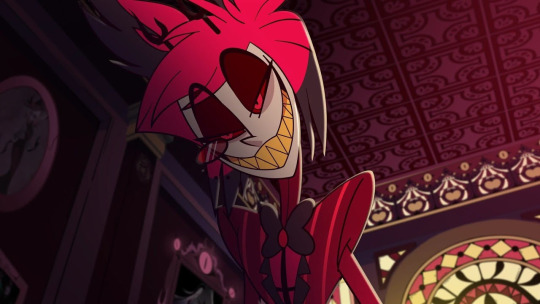
Alastor has been presented to us as an omniscient force: somehow possessing an awareness that makes us doubt ours, a stubbornness that shadows others, all while holding something to unveil. Alastor’s testament in the writer’s community shines through the controversy around his character, whether he has an altruistic nature while forbidding it, or is merely choosing to play a part in the circus Hell is, we can't say. It is because of this that I wanted to do an analysis of Alastor and look behind the veil he challenges others to look past.
On one hand, Alastor is a shadow. But if he's a shadow, who owns it? One can only become conscious of the shadow in personality by recognizing reality.
On the other hand, if the world is sheer entertainment, who will lead, who will act, and who will watch?
note: first analysis & post! hope it’s written well, considering english isn’t my native tongue.
note 2: i'll first list things i find interesting about his personality, how much of a mentor he rly is, and in the end i'll determine if he's the director, actor, or spectator. and of course his purpose of life, not for the show.
Alastor has a pathological need to exert his power.
It's not the biggest secret.
The need for control is fundamental in human experience and a drive of human nature. It is an ersatz emotion, in a way. It's a self-imposed need, not quite something to feel.
For someone like Alastor who abhors primal instincts, he’s driven by them. His instincts rule his world: he needs to have power, to rule in tyranny, to hunt, and to feel the thrill.
To represent Alastor as a Jungian Shadow or as a person with a conflicting Ego isn't too far-fetched. He is all that Charlie refuses to accept of Hell, and his own shadow betrays his face. If an inevitable force is neglected for too long, it'll fester and grow until depravity is wished for instead of what it represents. It is his id and superego that is unbalanced. His unconscious desires and his moral and social standing. To overlap is possible, and we can certainly see a fair share of unhinged and yet forcibly restrained moments of him with Charlie.
He is not good at controlling himself, he's a feral animal waiting just the right moment to pounce on his prey.
Someone who seeks to exert their control will look for someone in need of guidance. As a mentor figure, Alastor is complicated. With a regime to follow, it is he who festers on the darkness of Charlotte Morningstar and uses her need to know she matters to control her power, but it is also he who guides her to greatness and the like.
Soo...
There are many causes as to why obsession with control and power arises. Trauma, insecurity, misguided righteousness.
Positively, these kinds of people want to take charge and make an impact, seeking positions of leadership and pursuing others at their best. At their worst, they assert their power by controlling others to feel sure of themselves over how powerless they are otherwise.
But what if this need for control is (in most of situations) for attention because they need it to thrive and not uniquely for leadership because they’re insecure of their environment? it can be both, but one more than the other.
Alastor is a showman, contradicting himself in his ethics and in his phrases.
“No tacky circus decor,” when his philosophy of life is derived from entertainment and the destruction that would happen if he’s left unattended for too long. YOU are the circus alastor

In the Overlord meeting, he is left in disappointment and in ridicule as he expects attention due to his self-imposed importance. Recurringly, doubts over his power arise in the hotel thanks to his distaste for sinners and neglect towards them. He comes back after 7 years to be derided. Alastor is always caviling against authority, is this because he is the authority pushing down "rebels" in his world or wants to be it?
There are only two ways of winning this authority: 1. to destroy 2. to become
"I'm sure you've all been wondering!"

Characteristics of Alastor
aside from the obvious charm, of course!
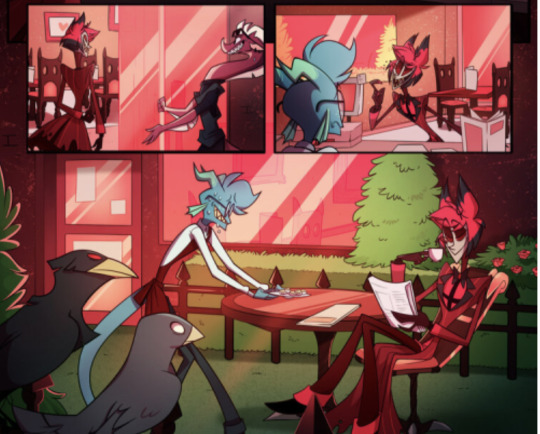
imposed belief of importance and/or of interest. It is not a deluded belief. It is something outsiders keep on giving him: the attention and thrill of being renowned. This can be seen from common sinners to Vox.
His list of priorities:
1. Alastor
2. Red fluff guy
3. Oh-Deer-Mug-Guy
4. Weird Cat Alastor
and so on.
And it's not entirely incorrect! Vox gives him so much attention, no matter if negative. While Alastor can build his radio empire thanks to Vox...
Alastor isn't entirely amused.
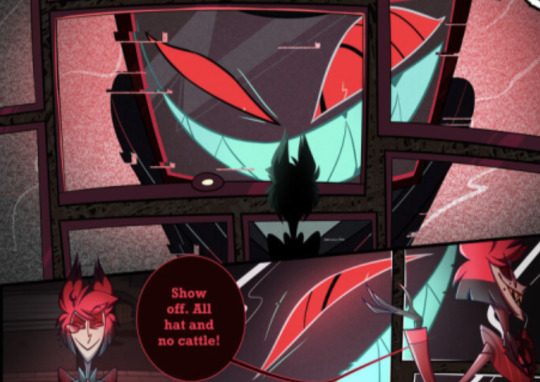
It's the annoyance.
Alastor is bemused at being threatened by others of an equal or higher rank, as seen with Lucifer as well.
Continuing...

2. this "narcissism" is assured by minions that he knows how to play like pawns.
If he cannot get his resource of attention from outsiders, he’ll get it himself with Niffty, Husker, and his weird-looking minions.
3.… all while destroying & humiliating those that are averse
See Vaggie in Alastor's reprise and in the series. See Sir Pentious and… everyone. He is a contradictory character, he pits everyone against each other so he looks amiable compared to them, and yet he can’t help but antagonize those allied with him because he sees them all as pawns that he needs to force authority over. he continuously makes the people in his surrounding environment be as unregal as they can be compared to the likes like him. He holds himself with such an air of confidence there’s no room to doubt, and there are no other doors that lead to other rooms. His only acquaintance who appears to view him as a person interested in business is Rosie, a fellow cannibalistic overlord who praises manners, amorality, and culpability.
Last thing to determine what exactly he is..
he likes dependency and thrives on it
he forces it beyond remedy and thrives in deficiency in both tastes and relationships. He also has an inherent lack of respect.

Alastor is incredibly observant, see his assumption of Charlotte's struggles with her father due to her lack of resistance and heightened trust in Alastor as an authoritarian and therefore paternal figure. He doesn't seek dependency of others, worship, because just they could be useful. He seeks this form of worship as a pathological need for attention and power aside from the efficiency. To be the most important person in the room and have someone to corrupt.
Charlie is a sheltered, young woman with childish hopes and dreams thanks to the care of the fallen angel, Lucifer and the first woman, Lilith (her sheltering mainly came from Lucifer and his inherent shame and culpability of raising Charlie in Hell while her hopes were enforced by her mother, the siren of hell).
Alastor, at his arrival, states his true intentions to Charlie:
“I want to watch the scum of the world struggle to climb up the hill of betterment only to repeatedly trip and tumble down to the fiery pit of failure!”
but quickly regains his moral high ground in his reprise of Charlie’s song, “ Inside of Every Demon is a Rainbow '' , raising a feeling of importance and awareness to the original singer. It gives the message that someone held on to that song with quite an admiration to the point of a reprise. You can assume that, but the lyrics are a whole other mess. Alastor warms Charlie up by giving her the assurance she so craves while demolishing her beliefs.
“inside of every demon is a lost cause,”
He causes discord between the other residents of the hotel, humiliating Vaggie further by slapping her in the ass, shoving her, and so on. He also takes Charlie to dance and squashes her cheeks. What a lovely boy!
…That’s what we think until we check in five days later, in Overture. Alastor is vain, so he only lets himself be tasked with a lazy chore(or a perfunctory courtesy) to gain trust and doesn’t accept any interventions from anyone, including the same person he did the chore for to manipulate. When Charlie, while praising him, interjects, Alastor isn’t convivial.
His behavior is rather ordinary for everyone in the hotel as well. He belittles all the same, making it normalized and taken as a bluff, when he is in fact lowering everyone, including Charlie, in his world-view.
Alastor is an egoist who doesn't advise acumen nor gives counsel. He has his own self-imposed self-discipline, recalcitrant and rigid all the time. That’s why he’s the perfect yet worst archetype of a mentor: he has a regime to follow and a mentor does not shape the younger counterpart into a reflection, they make the counterpart great like them. It's simple. While Alastor knows a lot of things and has his intellectuality, he's not willing to give it away for free.
And yet, he is apathetic to most of the struggles even if he can take the pathway of becoming morally helpful and increasing trust with his comrades. It simply isn’t his bother and is neglectful most of the time with those that are not superficial (while loathing the act of being superficial) and when something catches his interest, he’ll force his way in, deprecate them, and take advantage of the situation (ep2 & ep7). He’s so arrogant that it’s his flaw, so prideful that ONLY if his power is threatened, his demeanor will change and seeking attention thanks to his power will become insecure about his surroundings and a potential risk of losing the power he collected (dad beats dad). He's paranoid, prideful until something else great comes in thanks to culpability. He analyzes the situation and uses everyone's skeletons in the closets against them. He establishes his power on the defenseless so as to not lose his social standing when stressed.

It’s not that he has a great patience and tolerance... it’s that whenever he fears or feels threatened, he demonstrates it against the "vulnerable" behind scenes.
And it is in this that he finds the chance to mentor Charlie into greatness. A path into not snapping in front of Charlie and keeping his social image intact, impeccable, serving as someone to look up to for Charlie.

She’s filled with potential that I could guide
It is in episode 2, if not 1, when Alastor’s facade & pride starts to crumble as everyone questions his authority & power within and out of the hotel. he gets increasingly more stiff until "finale". but that's for another time!
So, after summing up Alastor's character in brief words,
what is he?
hypocrisy.. coming from ὑποκρίνομαι, 1. to answer 2. to interpret 3. (attic) to dialogue, to answer on the stage; to play a part, to be an actor.
He's like a chameleon, shifting between roles and motivations, often blurring the lines between mentor, antagonist, and entertainer.
He is a symbol of hypocrisy, playing different roles to suit his own desires while leaving others to question their own perceptions of reality. Whether he's an actor, a director, or simply a part of the crowd is "unknown". He's perfectly misaligned. But from what we know right now…

he's paranoid, in the end. without attention, without leading people, without any aspect of what makes him him, even the smallest things, he's scared of what he earned to be taken away, to be manipulated.
Once I figure out how to unclip my wings, guess who will be pulling all the strings?
IMO
an antagonistic force that doesn't mirror charlie, but rather is a shadow to make her confront everything while forcing her to give over her power: he's part of the crowd. he cannot participate thanks to his deal, he can't lead, but he can spectate. he isn't an entertainer: he expects to be the one the others are putting on a show for. His purpose in life is not to lead, it's to gain. to gain liberty, to gain power & control, to gain worship.
#this is disappointing#hazbin alastor#hazbin hotel#meta#alastor meta#alastor analysis#alastor altruist#alastor the radio demon#hazbin meta#alastor#hazbin hotel pilot#this is like obvious and i feel stupid but i guess some people need 2 wake up#dont worry guys i also like to indulge in fanon but come on we have a serial killer here with potential dont let angst go away
17 notes
·
View notes
Text
I’m making a post, tw: abuse, sa
Every single disingenuous “critique” of episode for that revolves around pretending that Angel was written “liking” his abuse is fucking disgusting. You are not making any commentary about the episode, you are showing how little you know about abuse victims. You also show your COMPLETE lack of media literacy around the subject
Poison is a song about needing your abuser. The way that they have you in their clutches. You know they are bad for you, you want to leave, but you feel like you can’t, you feel their poison taking hold of you.
Poison is about Angel’s struggle with his abuser and how he hurts no matter what he portrays. The reason it’s upbeat with the horrifically sad lyrics is because that’s the facade Angel Plays. He pretends to be the sexy, open, very down to clown porn star because that’s who he’s had to be to please his abuser. He can’t turn it off because if he does in front of Valentino, he’s horrifically hurt.
However, this is a double edged sword. It causes him to not only ruin his relationships with others by testing their boundaries and picking fights with them, but it leads him to self destruct. He can’t keep it up all the time. He openly admits to letting people drug him. He’s self destructing, trying his hardest to ruin himself because he thinks he deserves it and that maybe, just maybe it’ll keep him from being Valentino’s favorite toy.
This is WIDELY relatable to many abuse victims. We suffer socially from our abuse, not just mentally. We can become mean people. We lash out at others. And we can have codependent relationships with our abusers. We miss them. We want to be with them. Not because we LIKE BEING ABUSED BUT BECAUSE WE ARE CURRENTLY VICTIMS OF ABUSE. Abuse targets people who are vulnerable. People who don’t have a social circle, and creates one with their abuser in the middle. Abuse breeds codependency.
I am extremely critical of the Hellaverse. But callous commentary on the SURPRISINGLY NUANCED DEPICTION OF ANGEL’S ABUSE has truly soured me to Vivziepop critical spaces. You’re not “owning” Viv with that shit. Viv already got her season 2 and her paycheck. You’re hurting people who see their experiences with Angel Dust. You’re also telling on yourself that abuse victims can’t confide in you about their less than flashy and fun experiences/symptoms. Just so you know.
#a rant#I saw a comic from someone I liked and it really set me off#I’m still upset#but ya know#forgive typos#idc#just some thoughts#angel dust#hazbin#hazbin hotel#vivziepop#vivzieverse#hazbin analysis#hazbin meta#hazbin critical#hazbin critique#hazbin criticism#tw sa#tw abuse#tw#abuse#sa
136 notes
·
View notes
Text
After the finale of Hazbin Hotel I've seen some people theorising that Alastor used to be or is an angel due to his lines in the ending song.

And whilst I personally think that this was simply a metaphor, it is a fun theory and it has been proven that angels can hide in plain sight *cough* Vaggie, so it wouldn't be completely out of left field for this to be the case. Especially when it is heavily implied in the show that Alastor's deal whatever it was, is highly constricting his powers, not to mention the fact that when he manifested in hell he was already extremely powerful.
So, I would like to discus the possibility and logistics of Alastor being a fallen angel.
First, we know for a fact that Alastor has made a deal with someone and the two most likely candidates are Lilith or Eve, the reason most believe this is due to Alastor's instant hatred of Lucifer for seemingly no reason, there are a limited number of beings in hell that are stronger than him and the fact that he and Lilith disappeared 7 years ago is extremely suspicious. Not to mention that Alastor appears to have been summoned by Lilith during the pilot after Charlie called her, that and the fact that Alastor appears to stare at Lilith's portrait for longer than any other.
Eve is also a good option since we know that she also apparently fooled around with Lucifer in Eden and she also ate the apple of knowledge which most likely landed her in hell, plus due to the fact that Adam never mention's her and openly talks about sleeping with other women implies that they aren't together anymore. So Eve would have a very good reason to want to get revenge on Lucifer's family and heaven.
However, if Alastor was originally an angel it would be unlikely for him to meet these two let alone make a deal with them unless he had some form of importance in heaven, which would also make his disappearance not go unnoticed at the very least. But that being said, it doesn't have to be Eve or Lilith to make this theory work there is one other person who Alastor could have made a deal with and had enough power and authority to keep it a secret.
And that's Sarah after all she has been shown to make corrupt plans with the likes of Adam and perhaps even Lilith to keep heaven safe. There's also the fact that since Alastor manifested he has been exclusively targeting overlords, which would make sense if part of his deal with Sarah is to weaken hell by taking out their most powerful evils. As for why he may have disappeared I have no idea however, it's clear that if they have a deal they do not have a positive relationship with Alastor being desperate to escape his chains, which could be his main reason for seeking out the hotel and Charlie is his best option of escape.
But the biggest question for this theory is how on earth Alastor could have gotten into heaven, after all it has been stated that he was a serial killer in his mortal life and may have even cannibalised his victims. But that may not be as big of a deal as you think after all someone like Adam was able to get into heaven and he has killed thousands, not to mention it has been revealed in episode 6 that no one actually knows what gets you into heaven. So, it's safe to say that there's still a good chance that Alastor got into heaven naturally and chose to leave for whatever reason.
But year that's my thought's on how this theory could work if it was ever implemented in the show, I might make a part two but I'm fine with is for know.
#hazbin hotel#alastor#alastor hazbin#radio demon#hazbin hotel alastor#the radio demon#alastor the radio demon#hazbin hotel spoiler#hazbin spoilers#hazbin hotel theory#hazbin hotel season 1#hazbin meta#meta analysis#theory#fan theory
57 notes
·
View notes